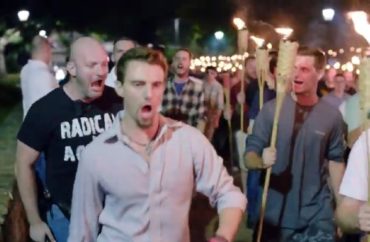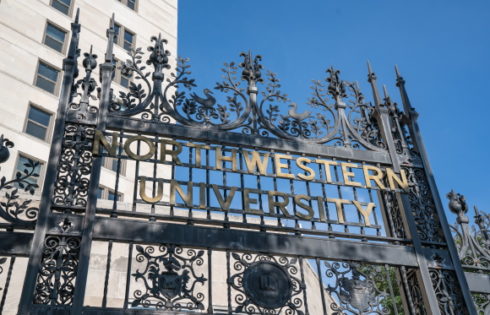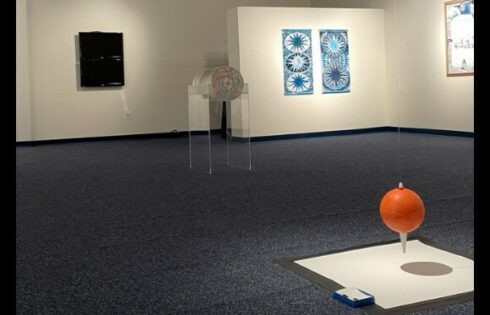
Befriend your enemies
#StayHome is the mantra of 2020. It’s for our own good in a time of peril, the authorities say. Let the danger pass. It’s reckless to speak up. You’ll make things worse.
Ben Stern is all too familiar with this message.
The authorities told the Holocaust survivor to stay home when neo-Nazis planned to march through his town. Forty years later, the authorities told Stern to stay home when white nationalists planned to march through Berkeley, California.
He didn’t listen.
The 99-year-old is one of the most compelling figures in a new documentary about another man, his onetime opponent Ira Glasser, the executive director of the American Civil Liberties Union from 1978 to 2001.
“Mighty Ira” is the story of how the ACLU became the leading organization fighting for civil liberties, regardless how unpopular the client, under Glasser’s tenure.
Its central narrative is the ACLU’s fight for the American Nazi Party to march in Chicago and its heavily Jewish suburb Skokie, home to hundreds of Holocaust survivors. That decision nearly killed the civil liberties organization, but it became a financial juggernaut under the stewardship of Glasser (below). The film ends with this generation’s Skokie, the Unite the Right march and rally in Charlottesville in 2017 (feature image, above).

Left unspoken in the documentary is how far the ACLU has fallen in recent years when it comes to viewpoint neutrality, best illustrated by its flip-flop on Charlottesville. You may remember the “liberalism is white supremacy” protest that shut down an ACLU lawyer’s speech at a nearby university.
Perhaps that’s for the best, because it would detract from the message at the core of “Mighty Ira”: Use your own speech. Trying to silence the speech of others only makes it more powerful, and nobody has a monopoly on the definition of “hate speech.”
Named after a poem written by an ACLU board member who voted against Glasser for the job, the documentary is especially important for young people to watch.
Through contemporary interviews, amazing archival footage and Glasser’s trips to New York City’s former Ebbets Field (below) and Comedy Cellar, “Mighty Ira” shows students that our raging debates about free speech versus hate speech are nothing new.

What is new: Many modern self-appointed civil rights leaders are no longer defending free speech. Glasser’s life and battles, however, illustrate that civil rights are dependent on free speech.
Just as important for young people who have grown up digitally walling themselves off from those with different viewpoints, “Mighty Ira” shows that people with starkly opposing viewpoints can become good friends.
Even the head of the ACLU and the founder of National Review. They just need to keep talking to each other.
A time of loyalty oaths
The Foundation for Individual Rights in Education produced the documentary, which is fitting because FIRE has arguably taken over the work that today’s ACLU scorns: defending unpopular speech for the benefit of all Americans.
“Mighty Ira” is not an eat-your-vegetables documentary, though. It has a sparkling soundtrack by the same folks who scored recent films with libertarian themes, “Little Pink House” and “Can We Take a Joke?”
Co-directed by FIRE’s Nico Perrino, the film excels in holding the viewer’s attention by bouncing between Glasser’s compelling life story and the Skokie case that defined the ACLU for the next 40 years.
Lawyer Bryan Stevenson of “Just Mercy” fame and Michael Meyers, the longtime civil rights activist who now inveighs against woke college segregation and speech policing, both sit for interviews. As Meyers (below) asks, what’s the point of the ACLU if it’s not defending Nazis and Black Panthers?

Glasser’s upbringing in Brooklyn illustrates how children playing in the street, with no social workers or coaches to oversee them, learned to solve their own squabbles with each other. (It’s a lesson that college administrators should take to heart.)
But it was Jackie Robinson joining the Brooklyn Dodgers in 1947 that first taught the white Jewish boy about racism – and lit the lifelong fire under Glasser.
He was outraged that Robinson couldn’t stay in the same hotel as his teammates: Glasser hated Jim Crow segregation “cuz he’s our guy.” He says Ebbets Field, which he regarded as a cathedral, may have been the only integrated public accommodation in America at the time.
In his Comedy Cellar interview, Glasser marvels that he doesn’t remember any “student activism” in the 1950s. It was a time of loyalty oaths, where people were afraid to go to unpopular political meetings. (Sound anything like campus today?)
Back in the days when a nobody could schedule a meeting with a U.S. senator, Glasser got a meeting with his political hero, Robert F. Kennedy, who encouraged him to accept a job offer from the ACLU’s New York affiliate rather than working for Kennedy. The senator’s assassination kept Glasser at the NYCLU.
RFK’s brother Ted would later speak at an ACLU gala, telling a story about a constituent who complained about Ted’s support for the ACLU until he learned it also defended the Klan. It feels so archaic now, looking at both today’s ACLU and Democratic Party.
MLK’s field general defends Klan rights on Donahue
Glasser hadn’t taken the reins at the ACLU when its Illinois affiliate accepted the Skokie case. Lawyer David Goldberger recounts that he became lead counsel because nobody else wanted to defend neo-Nazis. His general counsel ordered him to take the case so Goldberger could say he didn’t have a choice.
Thus begins one of the more entertaining parts of “Mighty Ira”: the Phil Donahue episodes.
The daytime talk show host had stacked his audience with Skokie residents, including Ben Stern, when he invited a young mustachioed Goldberger to defend his client’s right to march. Showing his concentration camp number, Stern asked if Goldberger would tell Jews to hide in their rooms while the Nazis marched (#StayHome).
Goldberger emphasized what every student should do when confronting speech they hate: Use your own speech, peacefully. You want to “sauce” the goose today, but you, the gander, will be sauced tomorrow. Hate speech means something different depending on who’s in charge.
Glasser appeared in another Donahue episode alongside Hosea Williams, Martin Luther King Jr.’s field general. It was assumed they would debate each other until Williams gave the audience a lecture on the importance of protecting the Ku Klux Klan’s rights, because they were also the NAACP’s rights.
(Amusingly, an audience member said the Constitution’s mention of “domestic tranquility” justifies censorship. She found agreement … with a white Christian minister on the stage. He said when his group rules America – and decides who gets to say what – there will be “peace and tranquility.”)
Jewish leaders in Skokie could not accepting the reasoning of Glasser and Williams, however. One rabbi promised “we will break their heads” if Chicago’s American Nazi Party came to town. (Archival footage from an earlier altercation shows the neo-Nazi leader Frank Collin brawling, Proud Boys-style, with what we’d call Antifa today. His face bloodied, Collin is beaming.)
Fascinating historical side note: Skokie was a backup target for neo-Nazis. The ragtag group led by Collin, who was later convicted of molesting young party recruits, had been denied a permit to rally against school integration in the park near their Chicago headquarters.
Seeking to chase whites to the suburbs where they had fled, Collin sent letters to several municipalities notifying them the party planned to march. Only Skokie responded, ordering them to stay away – setting up the conflict that (nominally) ended with a neo-Nazi legal victory.
The lesson should not be lost on today’s student activists, who only end up empowering those whose “hate speech” they try to shut down.
Governments shirk their duties to all sides
The real villains of “Mighty Ira” are not the activists who tried to shut down neo-Nazis, such as Stern, whose personal story is heartbreaking and half-century of activism nothing short of heroic.
It’s the elected leaders (today: college administrators) who set up unconstitutional barriers against speech unpopular in their community, whether Selma in the 1960s or Chicago in the 1970s, and then fail to keep apart opposing sides when they rally for their causes.
Chicago imposed a $250,000 insurance bond requirement to keep Collin’s gang out of Marquette Park – conveniently, as Glasser notes, because no insurance company would sell such a bond. It was straight of the Jim Crow playbook against civil rights marches – and had always been struck down.
Skokie first tried to ban the neo-Nazi visit as obscene speech (any ACLU lawyer’s favorite law to challenge) and then one-upped Chicago with a $350,000 insurance bond. It also banned marches in military-style uniforms – later used against Skokie’s own Jewish veterans (!).
It was only when the legal efforts failed that the governments decided they’d have to do their job and provide police protection for First Amendment activities.
Having won the right to march in Skokie, Collin (below) canceled the event and headed back to Chicago’s South Side, where the American Nazi Party learned that its enemies had First Amendment rights now.

In one of the more absurd archival sequences, a bunch of neo-Nazis crammed in one car notice the humongous counterdemonstration waiting for them in Marquette Park. Collin exclaims that his group’s banners aren’t visible amid the masses, whose chants will easy drown out his 20-odd group.
They can’t even amplify their chants because they forgot to bring an extension cord. Collin keeps muttering about the “pathetic” situation and cursing.
Fast-forward 40 years and you have Charlottesville, where everyone has forgotten the lessons of Marquette Park.
The Virginia municipality tried to move a demonstration in favor of Confederate statues to a park without a statue, which infuriated the organizer, Jason Kessler. An attempted injunction failed. Kessler riled up a mob to march on the University of Virginia the night before the planned rally.
Former ACLU President Nadine Strossen, the daughter of Holocaust survivors, notes the total absence of police where James Alex Fields plowed his car into counterdemonstrators the next day, killing Heather Heyer. It’s a chilling callback to the rise of Adolf Hitler, she says.
Interviewed about this incident at the Comedy Cellar, Glasser doesn’t minimize the tall order for law enforcement: They must “anticipate a volatile situation” and keep the sides apart without infringing on their rights. Even Heyer’s mother agreed on the white nationalists’ right to march, asking “who makes the decision” on whose speech is allowed in a 2019 interview.
The joy of ‘jousting’ with very different people
The most touching parts of “Mighty Ira” are the unexpected friendships he developed with critics, most notably National Review founder William F. Buckley.
The two men could not be more different, with Buckley’s aristocratic air, traditional conservatism and aversion to the subway, and Glasser’s street-smart Jewish liberalism and fondness for pickup basketball. (You’ll want to see footage of him dominating the court as an elderly man.)
Yet Buckley loved “jousting” with Glasser on his PBS series “Firing Line,” making the ACLU leader a nationally recognized face at a time when TV airtime was at a premium. Even as they jabbed each other for alleged faults in the other’s reasoning, each was smiling.
Eventually Glasser convinced Buckley to attend a baseball game with him, the sailing enthusiast’s first ever. They took the subway together, with TV cameras in tow. In one of my favorite segments, the duo even ganged up on Democratic Rep. Charlie Rangel on “Firing Line” to oppose the drug war.
Buckley called Glasser’s wife the week after he had a heart attack to ask how he was doing. He wrote a graceful yet sharp-edged letter thanking the “awful” Glasser for having him at the latter’s ACLU retirement dinner, and invited him to visit in Stamford anytime. They saw each other shortly before Buckley’s death in 2008.

While Buckley will always make you smile, Ben Stern will always make you hold back tears. The only survivor of the Nazis in his family, Stern has ample reason to loathe Glasser’s ACLU for helping neo-Nazis exercise their rights.
Yet he he hugged Glasser when the septuagenarian visited the nonagenarian at home, and told Glasser “I love you, I’m so proud of you.”
The first time they met, Glasser says the “bulldog” of a man told him “we’re gonna be friends.” He understands why Holocaust survivors have such a complicated relationship with free speech: They’ve been repeatedly told to not speak, to not challenge evil.
Stern’s life is a testimony to the importance of raising your voice, however. His daughter Charlene recounts that he was determined to go to Berkeley when white nationalists decided to march there in 2017.
He wasn’t on the speaker list for the counterprotest, but the organizers let Stern (below) speak. Thousands of people went silent to hear his frail voice for those few minutes.
“We stay home at our own peril,” Charlene says. It’s a message we must never forget.

IMAGES: Foundation for Individual Rights in Education/YouTube
Like The College Fix on Facebook / Follow us on Twitter






Please join the conversation about our stories on Facebook, Twitter, Instagram, Reddit, MeWe, Rumble, Gab, Minds and Gettr.